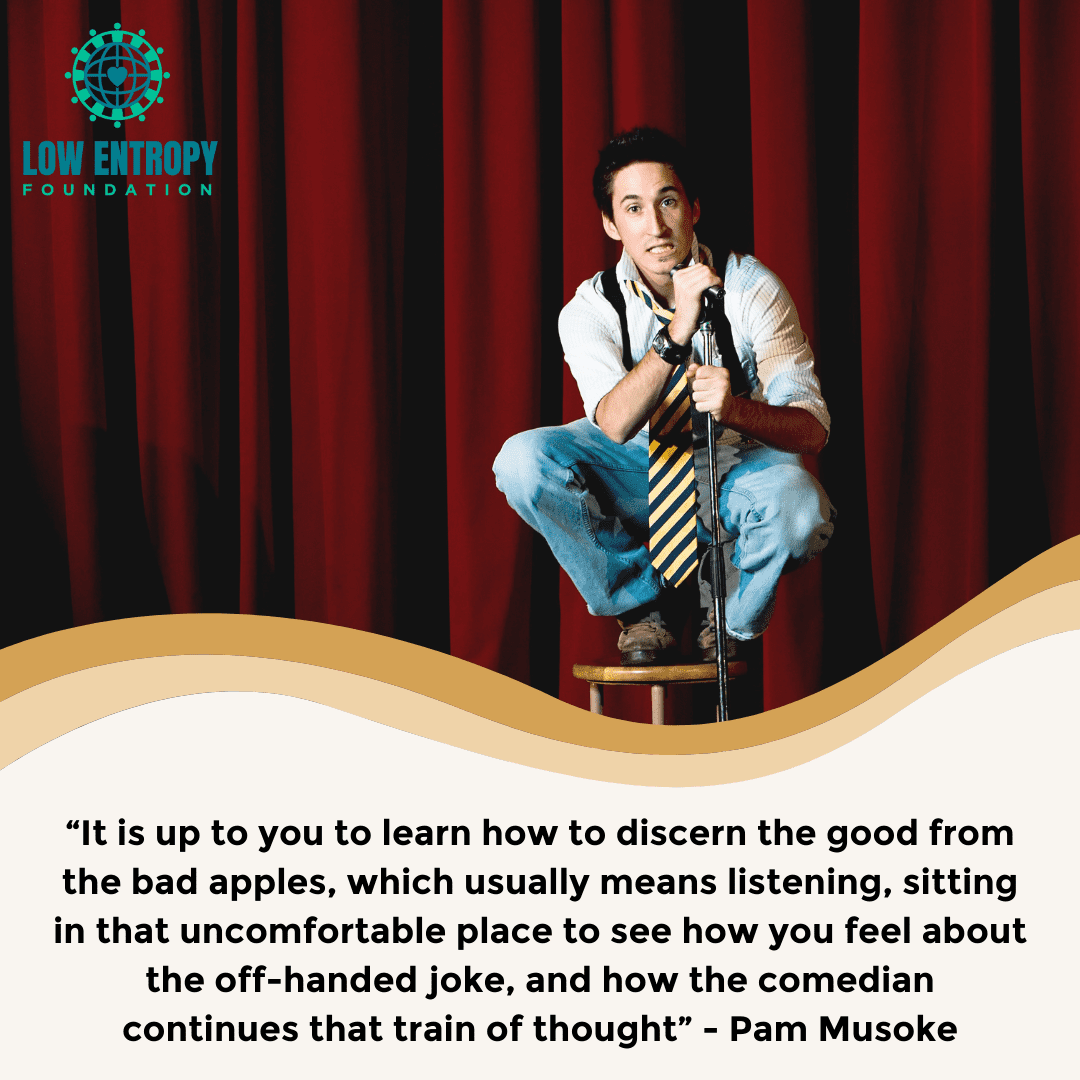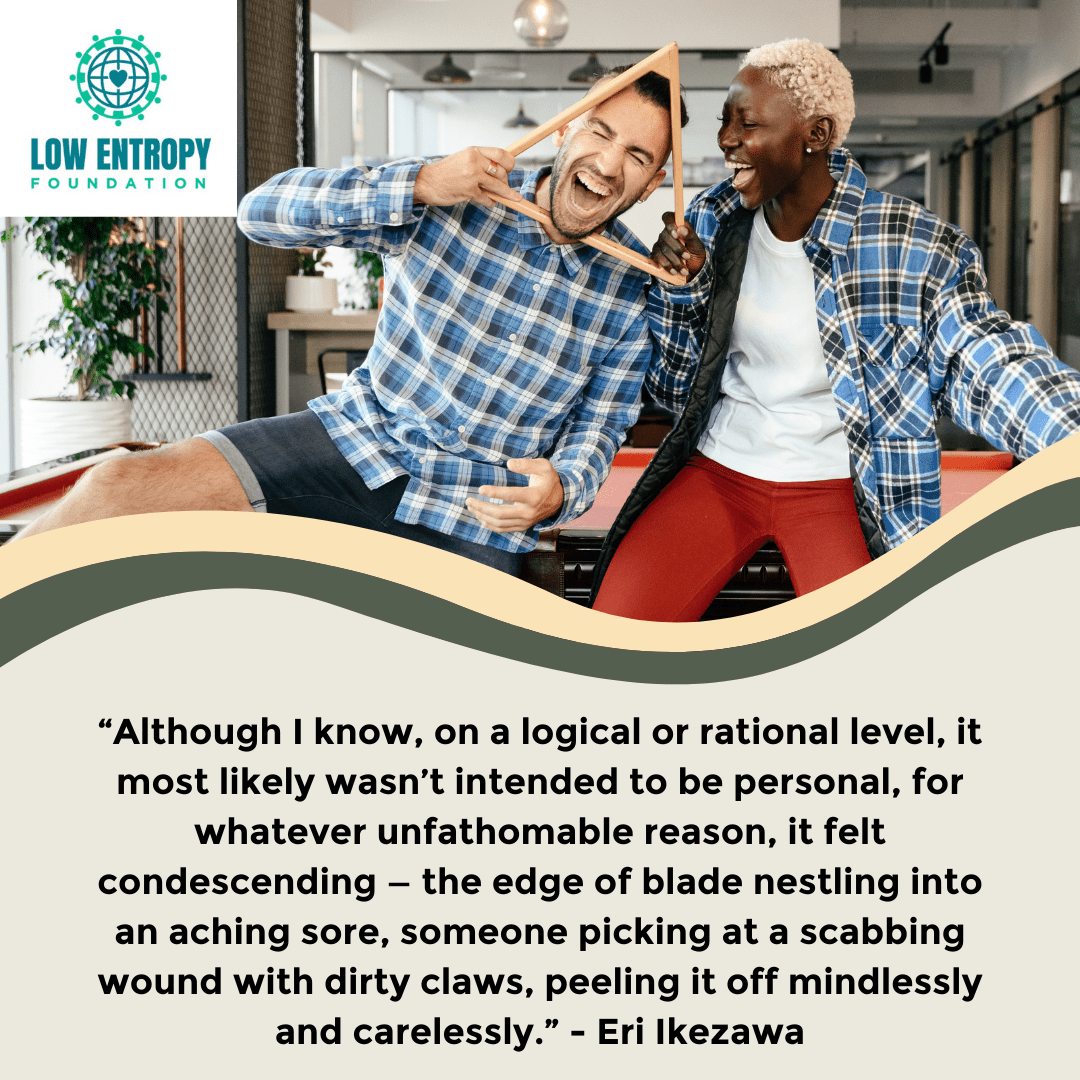Pamela Musoke (she/her/hers), Low Entropy Volunteer Writer
What is inappropriate when it comes to comedy? I know this is a question that will stand the test of time. Even among my family, we continually debate about what we consider crossing the line. And sooner or later, it becomes heated! So before it escalates to a shouting match (my most recent one with my seven month old niece, LOL!), we all agree to disagree in order to keep the peace. If you ask the question to five different people, you will get five different answers. It is such a personal question and depends on who you are, what you believe in and how you view the world.
I have to admit that there are times when I react quite fiercely to insensitive jokes, or more accurately, jokes that I perceive as insensitive. What I am learning to do is ask myself why this is. I have realized that the way in which I react to certain things, topics or situations which are new to me allows me to learn more about a side of myself that I rarely tap into. I feel that I need to understand my reactions, and I go to my trusted tool that allows me to be free of judgment and ridicule, journaling for my eyes only! By doing this I can study my emotional landscape to try and affirm or deny whether my reaction seems reasonable or unreasonable. When a decision is made, just like any other right, I reserve mine to make my final judgment if I find the other person in the wrong. But does it change how I feel about the comedian? Let’s hold that thought for a moment.
The funny thing is (no pun intended) that I might have fallen right into their trap. For some comedians I follow, they are controversial because they want to provoke us into a conversation, especially among those who have the luxury of not thinking about social justice issues. And I am willing to listen, no matter how uncomfortable it makes me feel because it gives me a chance to see certain issues from their perspective. I can see where I have fallen short in my thought process in how I recognize prejudices and implicit biases that I harbour and most likely act upon but to be receptive depends on the kind of fan relationship I share with the comedian.
To me, it is imperative that I have respect for the comedian who says it. I allow myself to sit in that discomfort because I trust the comedian’s intentions, i.e. to educate and bring awareness that I have failed to recognize living in my shoes. But, there are others who may tell insensitive jokes without much thought or reason; it often sounds unintelligent, distasteful, derogatory and much like bigotry. It comes from a place of greed, wanting that five minutes of fame, or maybe from desperation; to hang on to a career that was never meant for them or has been long over. It is up to you to learn how to discern the good from the bad apples, which usually means listening, sitting in that uncomfortable place to see how you feel about the off-handed joke, and how the comedian continues that train of thought. In a way, we are actually increasing our own emotional intelligence by doing so! Perhaps they do serve a purpose up to a point, but it also means we have to hold them accountable in a respectful way for the emotional pain they have caused through their callousness. I personally do not endorse “cancel culture”, but that is another controversial topic for another post!
This brings me to that question I mentioned earlier. Does it change how I feel about the comedian? And to maybe frustrate you one more time, it just depends. It comes down to intention as I mentioned earlier, and I may find myself listening to them less and less. The same goes for musicians and actors as I hold them to my own similar standards. But if they realize the error of their ways, and find ways to mend what they have broken, I will give them another chance.
So, I have taken this post in a different direction that I hope you can appreciate. I did not want this to be a debate, but instead to focus on how sensitive jokes can help you grow emotionally. It gives you a chance to reflect on who you believe to be and take it from there!
—
Pamela has a public health background. She enjoys reading, creative writing, and watching psychological thrillers and mysteries, with the occasional comedy.








